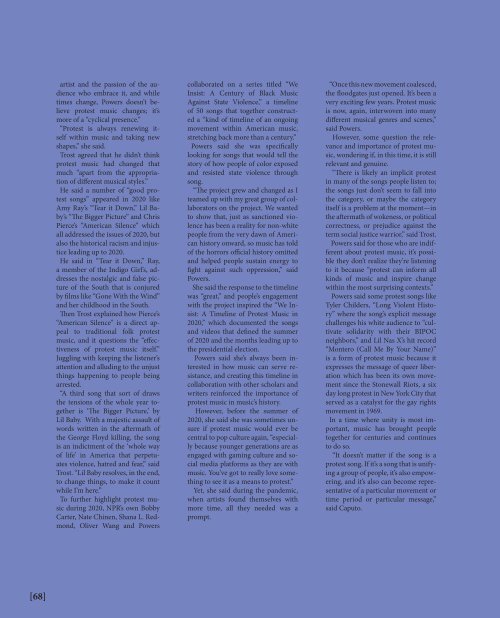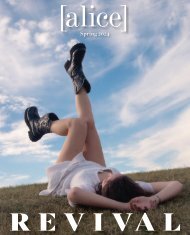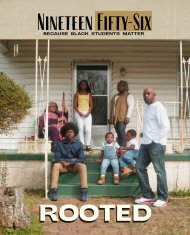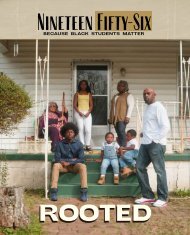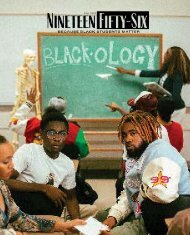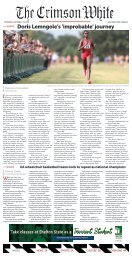Alice Vol. 7 No. 5
Volume 7 Issue 5 will renew your sense of vitality. Vitality is defined by the capacity to live, grow and develop, so we covered all our bases. We are obsessed with the award-winning drama “Pose” and the fashion surrounding ballroom culture, so we took a trip to the 70s in New York. No need to stress about your 21st birthday; we talked to students about how they spend milestone birthdays. We investigated the complex reality of pole dancing, illuminated Asian influence in media, analyzed child labor abuses in the beauty industry and talked with researchers about period poverty in the United States.
Volume 7 Issue 5 will renew your sense of vitality. Vitality is defined by the capacity to live, grow and develop, so we covered all our bases. We are obsessed with the award-winning drama “Pose” and the fashion surrounding ballroom culture, so we took a trip to the 70s in New York. No need to stress about your 21st birthday; we talked to students about how they spend milestone birthdays. We investigated the complex reality of pole dancing, illuminated Asian influence in media, analyzed child labor abuses in the beauty industry and talked with researchers about period poverty in the United States.
You also want an ePaper? Increase the reach of your titles
YUMPU automatically turns print PDFs into web optimized ePapers that Google loves.
artist and the passion of the audience<br />
who embrace it, and while<br />
times change, Powers doesn’t believe<br />
protest music changes; it’s<br />
more of a “cyclical presence.”<br />
“Protest is always renewing itself<br />
within music and taking new<br />
shapes,” she said.<br />
Trost agreed that he didn’t think<br />
protest music had changed that<br />
much “apart from the appropriation<br />
of different musical styles.”<br />
He said a number of “good protest<br />
songs” appeared in 2020 like<br />
Amy Ray’s “Tear it Down,” Lil Baby’s<br />
“The Bigger Picture” and Chris<br />
Pierce’s “American Silence” which<br />
all addressed the issues of 2020, but<br />
also the historical racism and injustice<br />
leading up to 2020.<br />
He said in “Tear it Down,” Ray,<br />
a member of the Indigo Girl’s, addresses<br />
the nostalgic and false picture<br />
of the South that is conjured<br />
by films like “Gone With the Wind”<br />
and her childhood in the South.<br />
Then Trost explained how Pierce’s<br />
“American Silence” is a direct appeal<br />
to traditional folk protest<br />
music, and it questions the “effectiveness<br />
of protest music itself.”<br />
Juggling with keeping the listener’s<br />
attention and alluding to the unjust<br />
things happening to people being<br />
arrested.<br />
“A third song that sort of draws<br />
the tensions of the whole year together<br />
is ‘The Bigger Picture,’ by<br />
Lil Baby. With a majestic assault of<br />
words written in the aftermath of<br />
the George Floyd killing, the song<br />
is an indictment of the ‘whole way<br />
of life’ in America that perpetuates<br />
violence, hatred and fear,” said<br />
Trost. “Lil Baby resolves, in the end,<br />
to change things, to make it count<br />
while I’m here.”<br />
To further highlight protest music<br />
during 2020, NPR’s own Bobby<br />
Carter, Nate Chinen, Shana L. Redmond,<br />
Oliver Wang and Powers<br />
collaborated on a series titled “We<br />
Insist: A Century of Black Music<br />
Against State Violence,” a timeline<br />
of 50 songs that together constructed<br />
a “kind of timeline of an ongoing<br />
movement within American music,<br />
stretching back more than a century.”<br />
Powers said she was specifically<br />
looking for songs that would tell the<br />
story of how people of color exposed<br />
and resisted state violence through<br />
song.<br />
“The project grew and changed as I<br />
teamed up with my great group of collaborators<br />
on the project. We wanted<br />
to show that, just as sanctioned violence<br />
has been a reality for non-white<br />
people from the very dawn of American<br />
history onward, so music has told<br />
of the horrors official history omitted<br />
and helped people sustain energy to<br />
fight against such oppression,” said<br />
Powers.<br />
She said the response to the timeline<br />
was “great,” and people’s engagement<br />
with the project inspired the “We Insist:<br />
A Timeline of Protest Music in<br />
2020,” which documented the songs<br />
and videos that defined the summer<br />
of 2020 and the months leading up to<br />
the presidential election.<br />
Powers said she’s always been interested<br />
in how music can serve resistance,<br />
and creating this timeline in<br />
collaboration with other scholars and<br />
writers reinforced the importance of<br />
protest music in music’s history.<br />
However, before the summer of<br />
2020, she said she was sometimes unsure<br />
if protest music would ever be<br />
central to pop culture again, “especially<br />
because younger generations are as<br />
engaged with gaming culture and social<br />
media platforms as they are with<br />
music. You’ve got to really love something<br />
to see it as a means to protest.”<br />
Yet, she said during the pandemic,<br />
when artists found themselves with<br />
more time, all they needed was a<br />
prompt.<br />
“Once this new movement coalesced,<br />
the floodgates just opened. It’s been a<br />
very exciting few years. Protest music<br />
is now, again, interwoven into many<br />
different musical genres and scenes,”<br />
said Powers.<br />
However, some question the relevance<br />
and importance of protest music,<br />
wondering if, in this time, it is still<br />
relevant and genuine.<br />
“There is likely an implicit protest<br />
in many of the songs people listen to;<br />
the songs just don’t seem to fall into<br />
the category, or maybe the category<br />
itself is a problem at the moment—in<br />
the aftermath of wokeness, or political<br />
correctness, or prejudice against the<br />
term social justice warrior,” said Trost.<br />
Powers said for those who are indifferent<br />
about protest music, it’s possible<br />
they don’t realize they’re listening<br />
to it because “protest can inform all<br />
kinds of music and inspire change<br />
within the most surprising contexts.”<br />
Powers said some protest songs like<br />
Tyler Childers, “Long Violent History”<br />
where the song’s explicit message<br />
challenges his white audience to “cultivate<br />
solidarity with their BIPOC<br />
neighbors,” and Lil Nas X’s hit record<br />
“Montero (Call Me By Your Name)”<br />
is a form of protest music because it<br />
expresses the message of queer liberation<br />
which has been its own movement<br />
since the Stonewall Riots, a six<br />
day long protest in New York City that<br />
served as a catalyst for the gay rights<br />
movement in 1969.<br />
In a time where unity is most important,<br />
music has brought people<br />
together for centuries and continues<br />
to do so.<br />
“It doesn’t matter if the song is a<br />
protest song. If it’s a song that is unifying<br />
a group of people, it’s also empowering,<br />
and it’s also can become representative<br />
of a particular movement or<br />
time period or particular message,”<br />
said Caputo.<br />
[68]


